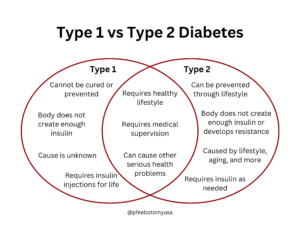04 Nov National Diabetes Month 2024: Comprehensive Guide to Diabetes Explained
November is a special month dedicated to helping people learn about diabetes. This is a health problem that affects many people all over the world. During National Diabetes Month, we focus on understanding this disease, supporting those who have it, and learning how to stay healthy. A clear explanation of diabetes is essential to grasp the full impact of this condition and the steps we can take to manage it effectively.
What is Diabetes?
Diabetes occurs when our body has trouble managing sugar. Sugar is important because it is the body’s number one energy source. For diabetic people, the body either doesn’t make enough insulin (a hormone that regulates blood sugar) or doesn’t use it right. As a result, sugar builds up in the blood, causing health problems.
An Explanation of Diabetes
Diabetes is a long-term condition that can cause serious health problems if not managed. Uncontrolled diabetes can lead to heart disease, kidney damage, nerve damage, and vision issues due to high blood sugar damaging blood vessels and nerves. Managing diabetes requires regular monitoring, medication, and lifestyle changes to help prevent these complications.
Different Types
There are two types of this disease: Type 1 and Type 2. People with Type 1 require insulin shots because their bodies don’t make insulin. This does not have a cure. Type 2 is when the body is not using insulin as it should. This can often be helped through lifestyle changes and medication.
Type 1 Diabetes
Type 1 diabetes is an autoimmune condition where the immune system attacks insulin-producing cells in the pancreas. People with this type produce little or no insulin and need lifelong insulin therapy. It’s often diagnosed in childhood or young adulthood but can happen at any age. Managing it involves monitoring blood sugar, taking insulin, and adjusting the diet to keep glucose levels stable.
Type 2 Diabetes
Type 2 diabetes is the most common form, happening when the body resists insulin or the pancreas doesn’t make enough. It’s often linked to lifestyle factors like obesity, inactivity, and poor diet.
However, genetics also play a role. Type 2 diabetes can often be managed with healthier habits like better diet and exercise, but some people may need medication or insulin therapy.
Gestational Diabetes and Prediabetes
Gestational Diabetes
Gestational diabetes develops during pregnancy when the body cannot produce enough insulin to meet the increased needs. Although gestational diabetes typically resolves after childbirth, it increases the mother’s risk of developing Type 2 diabetes later in life. Managing gestational diabetes involves monitoring blood sugar levels, following a healthy eating plan, and exercising regularly to make sure both mother and baby remain healthy.
Prediabetes
Prediabetes is a condition where blood sugar levels are higher than normal but not yet high enough to be classified as Type 2 diabetes. Without intervention, prediabetes can progress to Type 2 diabetes. However, early detection and lifestyle changes can prevent or delay the onset of diabetes. Regular screenings and adopting a healthier lifestyle are crucial steps in managing prediabetes and reducing the risk of developing full-blown diabetes.
How to Prevent Diabetes
The good news is that many cases of Type 2 diabetes are preventable. Simple lifestyle changes like exercising regularly and eating good foods can help. Avoiding sugary drinks and unhealthy snacks can also lower the risk. Making these small yet powerful changes can greatly reduce the chances of getting this disease.
We emphasize the importance of maintaining a healthy weight, staying active, and following a balanced diet to keep blood sugar levels in check. By focusing on prevention, we can reduce the incidence of diabetes and its associated complications.
How to Show Support
Living with diabetes can be overwhelming, but no one has to face it alone. Support from friends, family, and the community is vital. National Diabetes Month is about the importance of creating a supportive environment. Encouragement, understanding, and empathy can make a big difference. Making a support network can uplift people and help them during hard times.
Whether it’s offering a listening ear, helping with daily tasks, or simply being there, support from loved ones is invaluable for those managing diabetes. We believe in creating a community where everyone feels supported and empowered to take control of their health.
Creating a Healthier Future
National Diabetes Month reminds us of our responsibility to raise awareness, prevent, and provide support to those affected. By understanding the disease, making healthy changes, and offering support, we can create a better future for everyone. Let’s stand together and build communities where diabetic individuals can thrive.
We at Phlebotomy Training Specialists are committed to raising awareness about diabetes and its impact on health. Through our phlebotomy training programs, we equip future healthcare professionals with the skills and knowledge they need to support individuals with diabetes effectively.
By offering extensive hands-on training and real-world experience, we can make sure our students are prepared to make a positive impact in the medical field. Our dedication to excellence in education helps create a workforce capable of providing the best care for those affected by diabetes and other chronic conditions.
As we continue to expand our phlebotomy school locations, our mission remains clear: to empower our students with the tools they need to succeed in healthcare while contributing to a healthier, more informed society. Together, we can make a difference by fostering a deeper understanding of diabetes and the importance of proper medical care.


